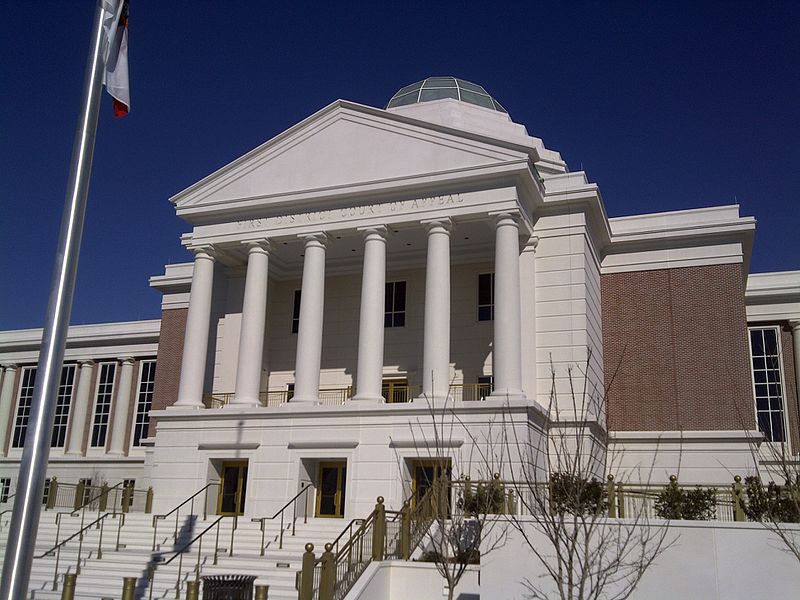
Florida's First District Court of Appeal
This is the second of two posts on the judicial history of Florida's Blaine Amendment with regard to public aid to private religious institutions. Part one can be read here. The U.S. Supreme Court is expected to weigh in on the constitutionality of state Blaine Amendments in 2020.
Lawyers defending Florida’s first school voucher program in Bush v. Holmes demonstrated the state historically allowed public funding to flow to many religious organizations providing public services, including through the McKay Scholarship for children with special needs. The First District Court of Appeal refused to acknowledge these programs.
Supporters of the Opportunity Scholarship program also cited several Florida Supreme Court cases which upheld aid to religious institutions as constitutional. But the appellate court found a way to ignore this precedent too.
Koerner v. Borck (1958) dealt with the last will and testament of Mrs. Lina Downey, who had donated a parcel of land to Orange County for use as a county park, but with the provision that Downey Memorial Church be granted a perpetual easement to access the lake for the privilege of baptizing members and swimming.
The court upheld the will, concluding,
“to hold that the Amendment is an absolute prohibition against such use of public waters would, in effect, prohibit many religious groups from carrying out the tenets of their faith; and, as stated in Everson v. Board of Education, supra, 67 S. Ct. 504, 505, "State power is no more to be used so as to handicap religions, than it is to favor them."
In 1959 the Florida Supreme Court heard Southside Estates Baptist Church v Board of Trustees, a case in which the court ruled religious institutions could use public buildings (in this case a public school) for religious meetings.
The court was not persuaded that minimal costs associated with the “wear and tear” of the building constituted aid from the public treasury, and concluded there was “no evidence here that one sect or denomination is being given a preference over any other.”
In Johnson v. Presbyterian Homes of Synod of Florida, Inc. (1970), tax collectors for Bradenton and Manatee County challenged a law that gave property tax exemptions to non-profits operating homes for the elderly after a religious organization applied. Presbyterian Homes of Synod, a religious non-profit operating homes for the elderly, maintained a religious atmosphere, offered religious services and employed an ordained Presbyterian minister who conducted services every day except Sunday. Most residents were even practicing Presbyterians.
The Florida Supreme Court determined the tax exemption benefit was available to all, not just Presbyterians, and ruled:
“A state cannot pass a law to aid one religion or all religions, but state action to promote the general welfare of society, apart from any religious considerations, is valid, even though religious interests may be indirectly benefited.”
Nohrr v. Brevard County Education Facilities Authority (1971) dealt with the issue of government issue bonds potentially being received by religious schools. The Florida Supreme Court found no problem here either.
In all four cases the Florida Supreme Court held the law did not violate the constitutional prohibition on direct or indirect aid to religious institutions. In all instances, the court examined who benefited from the aid, and required that the aid benefit the general public and/or required that no religious group be favored over the other.
The appellate court majority brushed aside these arguments, noting that the Opportunity Scholarship was different because the financial aid came directly from the state treasury, making the scholarship “distinguishable from the type of state aid found constitutional.” In fact, it appears the appellate court restricted Florida’s “no aid” provision to “payment of public monies,” though it failed to consider other similar programs such as McKay.
Having crafted itself exemptions to prior state Supreme Court precedent, the appellate court cited cases in Washington (2002), South Carolina (1971) and Virginia (1955) where state supreme courts held that direct subsidies to students were, in effect, benefits to religious schools.
This directly contradicted the U.S. Supreme Court decision in Zelman v. Simmons-Harris (2002), which determined the benefit to religious institutions from school vouchers were merely “incidental.”
The Florida Supreme Court had even weighed in on whether these benefits were direct or incidental during a 1983 case, City of Boca Raton v. Gilden, which upheld the city’s subsidy to a religiously affiliated daycare provider. The court declared:
“The beneficiaries of the city's contribution are the disadvantaged children. Any ’benefit‘ received by the charitable organization itself is insignificant and cannot support a reasonable argument that this is the quality or quantity of benefit intended to be proscribed.”
The appellate court in Bush v. Holmes failed to understand that the constitutional question hinged not on the method of aid, but who was the intended beneficiary of the aid. Though Florida’s constitutional language may appear clear, its longstanding history of neutrality in funding medical and educational services at secular and religious institutions, has muddied the waters.